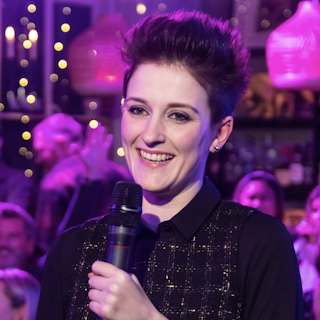Ditch the Pitch: The Apprentice 2017 winner on informal meetings and scrapping the PowerPoint
Pitching can be brutal and it’s always a lot of hard work. But is the process archaic and obsolete?
In the lead up to the annual Pitch Perfect conference, ‘Ditch the Pitch’ is a new series exploring what brands and agencies think of the pitching process and if substantial change needs to happen.
To kick start the series, The Drum spoke to The Apprentice 2017 winner and Sweets in the City founder, Sarah Lynn, on the hardest pitch she has had to do and why she thinks the days of PowerPoints slides are over.
What was the hardest pitch you have ever done?
The business pitches that I do on a day to day basis I'm very comfortable with because I know my product inside out and I know the business inside out. The toughest pitch for me would have been the hotel pitch in The Apprentice. We had to pitch to a hotel a budget for an interior design project. I had no idea about interior design, hotels, the market or where we should be. We had to pull together an idea of what we felt might be right. I had to estimate room occupancy over the course of a year, how that would work, what the ROI would be, how quickly the design of the room would pay for itself. It was a whole new area. That was a really tough pitch.
Thankfully, we weren't far of the money, we estimated at 65% room occupancy, worked out how quickly they would make their money back. We did an OK job, but it was very tough and very embarrassing to be stood there and to know that you could be exposed at any moment not knowing the business inside out.
Was it successful?
We were successful which was fantastic, but there were some excruciating moments where we were exposed, and we clearly hadn't thought through with the elements that were involved in interior design or hotel budgeting. It was quite tough to stand there and deal with that criticism but it's important sometimes to go through those experiences because you come out from the other side with a lot of knowledge and sometimes the best learning is the learning of how not to do something as much as how to do it. A lot of us know our strengths and we know how to do the good bits. Learning what your weaknesses are is really helpful.
What did you learn from it?
Getting your numbers right is very important. Even if you're numbers aren't right, having a logical process to them is just as important. If you are exposed or off the money, you can explain why that is. You should always work through your numbers, make sure they stack up and that you have logic behind them. That's always possible, even if you don't know the market you can always work out why you're thinking in a certain way and have that ready to explain.
Has the pitch process become far too complicated?
I’m a more comfortable pitcher in an informal setting. The days of standing up in front of PowerPoints and clicking through slides are done. The best form of pitching is engagement, visual presentations that could be done through an iPad, chat, through brochures etc. I don't think you have to stand there and click through slides to have an efficient or effective pitch now.
Is it time to ditch ‘request for information’ documents (RFIs) or even the ‘chemistry meetings?
In certain industries they are still needed, but it does very much depend on the environment and the product you're selling. Whether it's a need or want based product. Whether it's more conceptual, whether it's very tangible. Every industry has their criteria and their own way of working but in my industry, people are buying this product because they want it, not because they desperately need it. Having things like hard samples and products for them to touch, feel and eat is far more important than a list of slides. People just switch off.
Is taking part in a pitch always a logically financially viable process these days?
It's still important to go through the pitch experience and to pitch regularly. You really need to understand what your customers and target demographic are looking for. Depending on what some of the big retailer’s process is, it's always a little bit complicated, but it's the way they operate and until they change that we have to be able to respond to it and work with it.
As an industry are we guilty of pitching ourselves to the ground?
Perhaps. The most important thing to remember is that people buy from people. They don't buy from PowerPoint slides. It's about talking, engaging and understanding your client. Only when you sit and talk to them do you get a real measure of them. You need to be able to respond to that. If you are in a more informal setting you can listen to them and often there might be another idea that's in your locker that you haven't put on a slide that comes out from something that is said in that meeting. I always prefer to work that way and to respond to the client and adapt.
Lynn will attend Pitch Perfect on 13 September for a Fireside Chat, discussing building the business, what's it like to have the help of Lord Sugar, what the partnerships she is creating are, how is she working with the marketing sector and offer an insight into how Sweets in the City will grow.
This event focuses on helping agencies win new business. Check out the website for more information and to purchase tickets.
Sponsors of the event are BD100 and Digitas.

